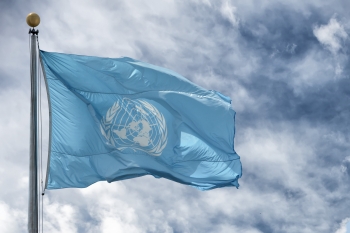On 23 May 2022 the representatives of Dominican Republic, European Union, France, Guatemala, New Zealand, Norway, and United States hosted the side event about the implementation of the UN Security Council 2475 on the protection of civilians with disabilities adopted in 2019. The meeting was chaired by the representatives of Poland and the United Kingdom aiming at deepening the dialogue on the promotion of the rights of people with disabilities and their protection during armed conflicts. The discussion was then supported by the share of concrete examples reported by experts in Syria and Yemen.
The meeting was opened by a statement from Mr. Gopal Mitra, Senior Social Affairs Officer in the Disabilities Team of the Executive Office of the Secretary-General. He underlined the most important issues concerning the protection of civilians with disabilities; particularly, he stated that there are several problems that people with disabilities continuously face during armed conflicts and that it is necessary to take into consideration for an adequate implementation of the Resolution. Among these issues, he emphasized the struggle of these people for obtaining food, water, and medical treatments – also visible in the current conflict in Ukraine -, and their difficulties in accessing evacuation centers. Mr. Mitra then underlined that “persons with disabilities should be part of the Security Council and not a subject of its meeting”. He concluded his open statement by highlighting the necessity of this meeting to discuss the results achieved since the adoption of the Resolution and improve its implementation.
The floor was then passed to Dr. Raja Abdullah Almasabi, Chairwoman of the Arab Human Rights Foundation in Yemen, who assists people with disabilities who are facing continuous struggling due to the seven-year war in the country. She stated that these people are the target not only of airstrikes but also of the economic crisis which inevitably followed the conflict. Precisely, she underlined that the war in Yemen has affected disabled people in different ways: first of all, they are not able to escape under attacks, thus making them the most vulnerable categories among civilians; then most of the resources available to them decreased significantly; before the war, more than 300 local organizations were active for the support of people with disabilities, but now only a few have been left. After her statement, Sabreen Al Dweib, Inclusive Humanitarian Action Specialist, Humanity & Inclusion (HI), talked about the specific case of Syria and pointed out the four kinds of gaps present in the Syrian crisis. Among the data that she presented, some are extremely alarming: in Syria, 66% of households have at least one member with disabilities, underling the necessity for a structured response in the country aimed at people with disabilities. Continuing then her statement, she emphasized gaps in the country’s crisis: the lack of data on persons with disabilities, the lack of empowerment of these people, and the lack of national-level policies and guidelines for the protection of this vulnerable category.
After these two concrete examples, Abigail Hartley, Chief of Policy, Advocacy, Donor Relations and Outreach, UN Mine Action Service (UNMAS), drew attention to the implementation of significant commitments for the inclusion of people with disabilities. Firstly, she called for the development of action plans, for the improvement of the accessibility of these people to the basic services, and for the enhancement of staff capacity in these situations. Then, Gergely Sebastien Pasztor, Senior Inclusive Programming Advisor, International Committee of the Red Cross (ICRC), added that more often during conflicts, families with disabled people are forced to choose who can be saved or not, noting how urgent measures are necessary, both in long-lasting conflicts such as in Yemen and in the current situation in Ukraine.
Some States reflected also on the need for peacekeepers to adopt an intersectional approach in order to be able to safeguard everyone during armed conflicts and to avoid people with disabilities being the first who are left behind.
Overall, the participants agreed on the inadequacy of the implementation of the Resolution 2475 (2019) till the present moment; on the other hand, they also recognized that they need to be realistic about the efforts that can be done on this matter and for this reason appropriate mapping of the partners operating on this is necessary.
By Sofiya Rinci Zubok and Alexia Tenneriello




